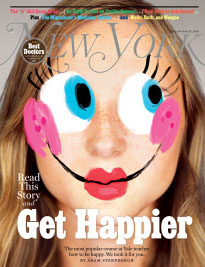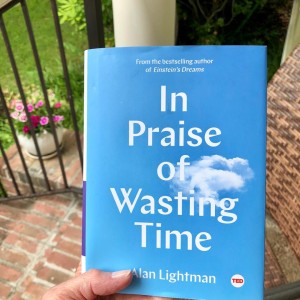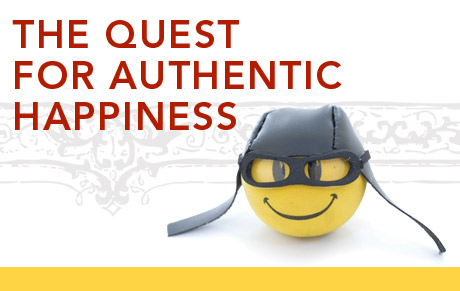 I just scored a 3.08 on a scale of 1 to 5 on the Authentic Happiness Inventory designed by folks at the University of Pennsylvania. The score reflects my overall “happiness” compared with others in my age group, zip code, education level, gender, and occupation group. Although I think it’s interesting that “writer” isn’t even listed as an occupation, so I checked “artist,” the closest option to my occupation. Why did I take this inventory?
I just scored a 3.08 on a scale of 1 to 5 on the Authentic Happiness Inventory designed by folks at the University of Pennsylvania. The score reflects my overall “happiness” compared with others in my age group, zip code, education level, gender, and occupation group. Although I think it’s interesting that “writer” isn’t even listed as an occupation, so I checked “artist,” the closest option to my occupation. Why did I take this inventory?
This morning, with my morning coffee, I read an article in the recent issue of New York Magazine, “The Cure for New York Face,” about Professor Laurie Santos’s new course at Yale University, PSYC 157: Psychology and the Good Life. I was struck by the statistics—especially among people who seem to have lots of “reasons” to be happy, from an exterior point of view. Of course there’s lots about two things that seem related to our “happiness”—time and money, and how we value them and spend them.
 Some parts of the article reminded me of the wonderful little book I read recently by Alan Lightman, In Praise of Wasting Time. I bought and read this book a few weeks ago, primarily because its author wrote the Foreword to the anthology I edited that was recently published by University Press of Mississippi, Southern Writers on Writing. Alan is from Memphis, but teaches at MIT now. A physicist. And a novelist. Interesting combination, and he brings both of those gifts to bear in his book, and his TED talk.
Some parts of the article reminded me of the wonderful little book I read recently by Alan Lightman, In Praise of Wasting Time. I bought and read this book a few weeks ago, primarily because its author wrote the Foreword to the anthology I edited that was recently published by University Press of Mississippi, Southern Writers on Writing. Alan is from Memphis, but teaches at MIT now. A physicist. And a novelist. Interesting combination, and he brings both of those gifts to bear in his book, and his TED talk.
Last fall I did a post about Gretchen Rubin’s Happiness Project, “Moments of Happiness.”
Last March I did a post reflecting on a Wall Street Journal article, “Two Types of Happiness.”
The same month I read and reviewed Daphne Merken’s book, This Close to Happy.
Five years ago I was blogging about an article in Psychology Today: “Mindfulness Does Not Lead to Happiness.”
And six years ago I wrote this one: “Permission to NOT Be Happy.”
Are you seeing a trend here? And yet, I do feel that I am “happier” now that I was six years ago. And I’m actually a bit surprised that I didn’t score higher on the Authentic Happiness Inventory. But I do tend to be quite honest and in touch with my feelings. From a spiritual point of view, I sometimes wonder how important “happiness” is, as opposed to what seem to be deeper states like “peace” and “contentment.”
 One thing I found interesting in the New York Magazine article was the author’s comments about money and happiness. His study showed that $75,000/year seems to be the salary “scientifically proven to provide the maximum amount of well-being.” So, he noted that in one study people making $30,000 a year were asked what salary would make them truly happy. The average answer was $50,000. But people making $100,000 a year said, on average, $250,000 would make them happy. Maybe it’s the old adage that the more we have, the more we want. I’m thinking about this now, not in terms of financial success, but with my writing career. Five years ago I was working with a New York literary agent (whom I would later part ways with) on my novel, CHERY BOMB, wondering if it would ever be published. When it came out last year—with a small press in Mississippi and not with one of the “big five”—I was “happy” to be published. It was a lifelong dream finally coming true. Actually, having three books published last year was pretty amazing. And a fourth this month. So, why is it that I still want “more”? Why am I now querying literary agents again (for my linked short story collection) rather than submitting it to an academic press?
One thing I found interesting in the New York Magazine article was the author’s comments about money and happiness. His study showed that $75,000/year seems to be the salary “scientifically proven to provide the maximum amount of well-being.” So, he noted that in one study people making $30,000 a year were asked what salary would make them truly happy. The average answer was $50,000. But people making $100,000 a year said, on average, $250,000 would make them happy. Maybe it’s the old adage that the more we have, the more we want. I’m thinking about this now, not in terms of financial success, but with my writing career. Five years ago I was working with a New York literary agent (whom I would later part ways with) on my novel, CHERY BOMB, wondering if it would ever be published. When it came out last year—with a small press in Mississippi and not with one of the “big five”—I was “happy” to be published. It was a lifelong dream finally coming true. Actually, having three books published last year was pretty amazing. And a fourth this month. So, why is it that I still want “more”? Why am I now querying literary agents again (for my linked short story collection) rather than submitting it to an academic press?
 I put this question to a very spiritual person whom I trust, and he encouraged me that it was a normal progression in my career to desire this next step up. That I wasn’t being obsessive about “success” in an unhealthy manner.
I put this question to a very spiritual person whom I trust, and he encouraged me that it was a normal progression in my career to desire this next step up. That I wasn’t being obsessive about “success” in an unhealthy manner.
And yet I find myself praying—yes—for more success. My novel is entered into two prestigious writing contests and I’m waiting to hear the results this summer. Would I find a greater level of “happiness” if it wins one of those awards? Or even makes a short list or becomes a finalist? Of course I believe that would make me happier, but is that a superficial goal?
Again, I’ve been struggling with this for years, as these posts show:
“I Want More” (from 2016)
“We Want More” (from 2013)
It IS interesting to read those posts now, as someone who quit drinking almost nine months ago. I still want MORE (potato chips, chocolate, and—in conflict with those cravings—a skinnier body) almost every day, but I take encouragement from the fact that I was able to tame my out-of-control desire for more vodka, and hope that eventually the strength (and God’s grace) that enabled me to do that will cross over into other areas of my life. Like food. And contentment in my career.
I’d love to hear from my readers about your take on happiness. And if any of you take the Authentic Happiness Inventory, please let me know what you thought about it. Meanwhile, have a great weekend!
I scored 3.96 on the questionnaire-but I feel like I score a 10 in my life. I’m not sure how they come up with the results. Of course I could DO more, absolutely I could have more money – but do I need that to be happy? No.
Happiness is a choice. I choose to look at what I have, instead of worrying about what I don’t. Some people see a glass half empty, when actually it’s always full. A glass without water isn’t empty, it’s full of air. It’s a clean slate, ready for you to fill it with whatever you choose.
Choose happy.
Such good words, Mandy. Thanks so much for your thoughts!
Happiness as a concept is becoming more and more difficult for me to wrap my head around. I can relate much more easily to peace and contentment, as you reference in this post.
Four weeks ago, we moved my mom into a hospice residence after almost a year of hospice care in her and my dad’s apartment in our local area. Just as we were making the move, it was announced that a chapbook of poems that I wrote about her illness was a finalist in a contest, which is a first for me. Under the circumstances, “happy” doesn’t seem like an applicable word to describe how I feel.
Wow. I hope that your mother’s new residence is good for her and for you and your dad. What a long year you’ve had! And yes, the timing of the poetry book being a finalist is interesting. *sigh* Thanks, always, for reading and sharing.
Perhaps in a somewhat similar vein, I got a lot of insights from The Book of Joy by the Dalai Lama and Desmond Tutu.
I haven’t read that, Robert, but it sounds amazing. Thanks.